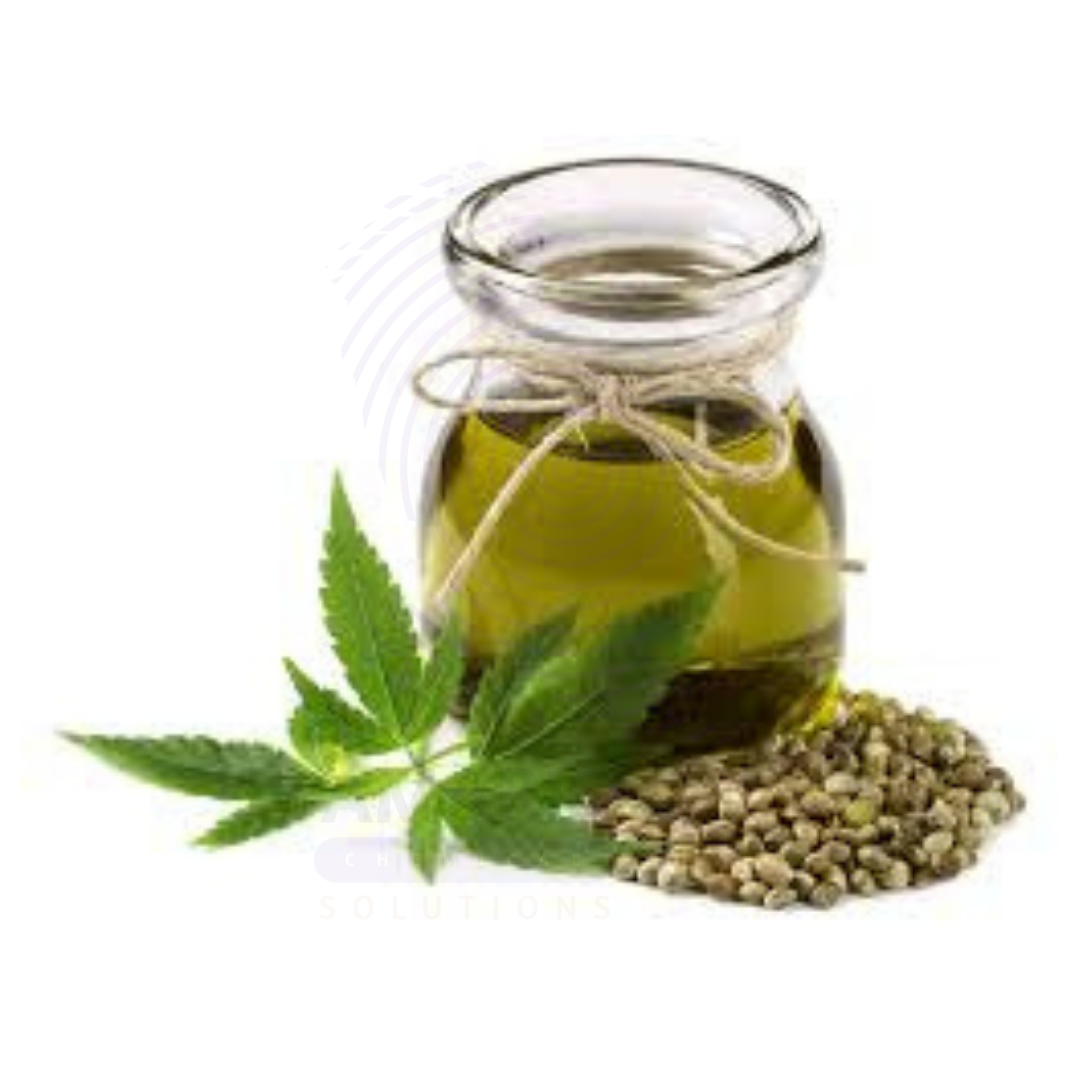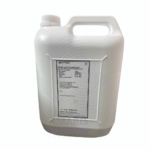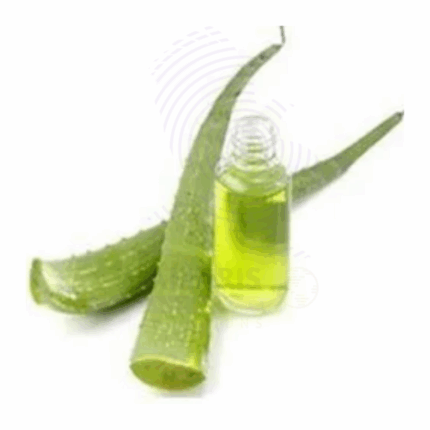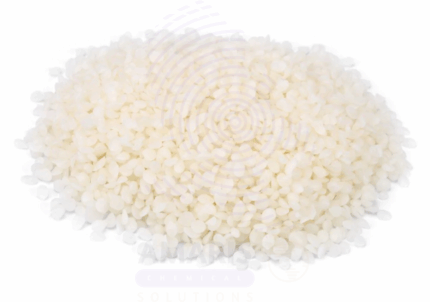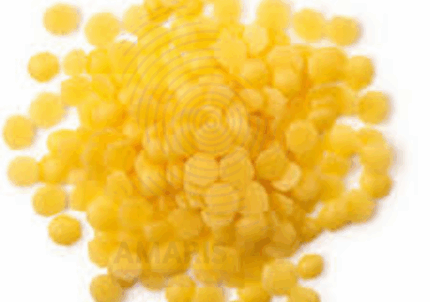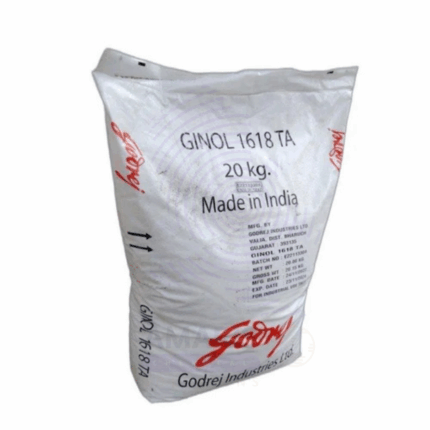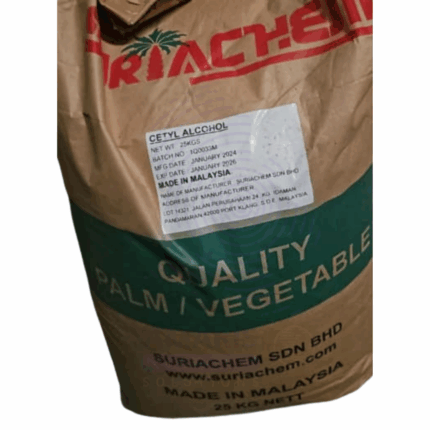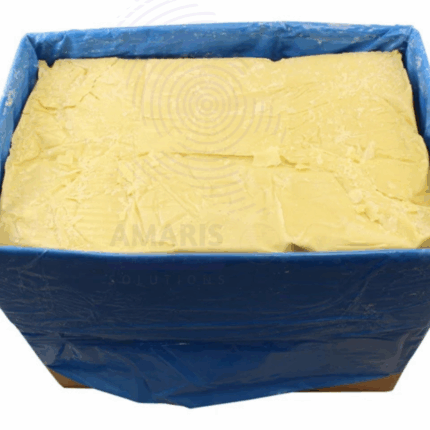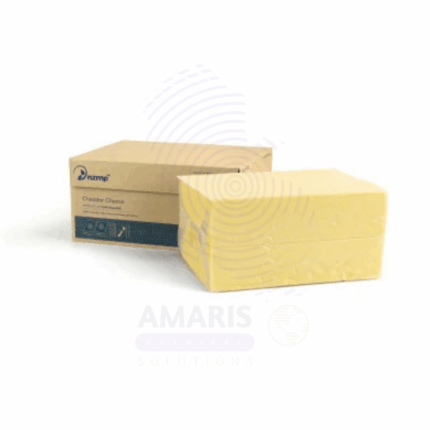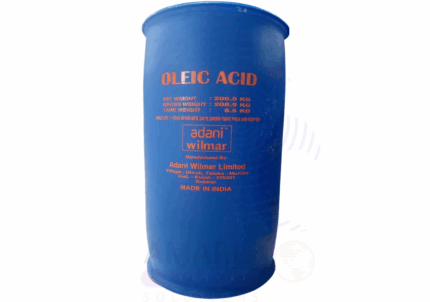Hemp Seed Oil
Whatsapp Order
Hemp Seed Oil is a cold-pressed oil extracted from the seeds of the Cannabis sativa plant. Unlike CBD or THC oils, hemp seed oil contains no cannabinoids and is valued for its rich content of essential fatty acids, including omega-3 and omega-6, as well as antioxidants and vitamins A, C, and E. It has a light to dark green color and a mild, nutty aroma.
Due to its highly moisturizing, anti-inflammatory, and skin-rejuvenating properties, it is widely used in skincare, haircare, pharmaceuticals, and nutritional supplements. It also finds applications in paints, lubricants, and industrial formulations thanks to its stability and bio-based origin.
Description
Table of Contents
Toggle
Hemp Seed Oil
Primary Uses
- Cosmetics and Personal Care
- Used in lotions, creams, and facial oils for its deep moisturizing and skin-repairing properties
- Included in anti-aging products to help restore elasticity and combat oxidative stress
- Added to hair care products like conditioners, masks, and scalp oils for nourishing dry or damaged hair
- Used in lip balms and body butters to soften and soothe chapped skin
- Applied in formulations for acne-prone or sensitive skin due to its non-comedogenic nature
- Found in beard oils and grooming products for its lightweight hydration
- Pharmaceuticals
- Used as a carrier oil in topical drug delivery systems and balms
- Applied in therapeutic creams for inflammatory skin conditions such as eczema and psoriasis
- Incorporated in nutraceutical formulations for cardiovascular and joint health
- Food and Beverage Industry
- Used as a dietary supplement due to its high omega-3 and omega-6 content
- Added to health drinks, smoothies, and salad dressings for nutritional benefits (food-grade only)
- Used in vegan and vegetarian cooking for its nutrient density
- Industrial Applications
- Used as a base in bio-lubricants and biodegradable greases
- Applied in eco-friendly paint formulations and coatings
- Included in polymer blends and sealants for sustainable industrial use
Secondary Uses
- Aromatherapy & Wellness
- Used as a carrier oil in essential oil blends for massage therapy and relaxation
- Applied in calming blends to soothe irritated skin and promote skin recovery
- Pet Care Products
- Used in pet grooming sprays and skin treatments for dry or flaky fur and paws
- Incorporated in dietary supplements for pets to support coat health
KEY PRODUCT FEATURES
1. Basic Identification Attributes
- Botanical Name: Cannabis sativa
- Common/Trade Name: Hemp Seed Oil
- INCI Name: Cannabis Sativa Seed Oil
- CAS Number: 89958-21-4
- HS Code: 1515.90
- Synonyms: Virgin Hemp Oil, Cold-Pressed Hemp Oil
2. Physical & Chemical Properties
- Physical State: Liquid oil
- Color & Odor: Light to dark green; mild, nutty aroma
- Solubility: Insoluble in water; soluble in alcohol and oils
- Refractive Index: 1.470 – 1.485
- Specific Gravity: 0.910 – 0.925
- Acid Value: ≤ 4.0 mg KOH/g
- Iodine Value: 140–170
3. Safety & Hazard Attributes
- GHS Classification: Not classified as hazardous
- Toxicity: Non-toxic, safe for ingestion and topical use
- Allergen Information: Nut-free; generally safe for sensitive skin
- Exposure Limits: No known occupational exposure limits
4. Storage & Handling Attributes
- Storage Conditions: Store in a cool, dark place away from heat and light
- Container Type: Food-grade or pharmaceutical-grade containers
- Shelf Life: 12–18 months when properly stored
- Handling Precautions: Use airtight containers to prevent oxidation
5. Regulatory & Compliance Attributes
- Compliant with EU, FDA, and COSMOS standards for cosmetic and food use
- Approved for topical and ingestible use within regulated limits
- Produced in GMP-certified facilities
6. Environmental & Health Impact
- Biodegradability: Fully biodegradable
- Ecotoxicity: Low ecological risk
- Bioaccumulation: Not expected to bioaccumulate
SAFETY HANDLING PRECAUTIONS
Safety Handling Precautions
- PPE Required: None under normal use
- Handling Guidelines: Protect from light and air to prevent rancidity
First Aid Measures
- Inhalation: Not applicable
- Skin Contact: Safe under normal use; rinse if irritation occurs
- Eye Contact: Rinse with water if accidental contact occurs
- Ingestion: Safe in food-grade form; consult physician if adverse reaction occurs
Firefighting Measures
- Fire Hazards: Combustible oil
- Extinguishing Media: CO₂, foam, dry chemical
- Special Precautions: Use standard precautions
- Hazardous Combustion Products: Carbon dioxide, carbon monoxide
Related products
Aloe Vera Oil
Aloe Vera Oil is an oil-based extract derived by infusing Aloe vera (Aloe barbadensis) leaves into a carrier oil such as coconut, soybean, or sunflower oil. It captures the beneficial compounds of aloe—including polysaccharides, vitamins, enzymes, and amino acids—in an oil-soluble form ideal for cosmetic, therapeutic, and personal care applications. Known for its soothing, anti-inflammatory, and moisturizing properties, Aloe Vera Oil is widely used in skin and hair care formulations.
This gentle, skin-friendly oil is suitable for sensitive skin and is commonly employed in after-sun products, healing ointments, massage oils, and anti-aging creams. It provides hydration, calms irritation, and promotes skin regeneration while adding emollient and conditioning benefits.
Avocado Wax
Avocado wax is a natural plant-derived wax extracted primarily from the pulp and seed of the avocado fruit (Persea americana). It appears as a hard, yellowish wax with excellent emollient, film-forming, and moisturizing properties. Valued for its biodegradability, compatibility with various formulations, and sustainability, avocado wax is widely used as a natural alternative to synthetic waxes in cosmetics, pharmaceuticals, food, and industrial applications.
Candelilla Wax
Candelilla Wax is a natural vegetable wax derived from the leaves of the Euphorbia cerifera shrub, native to northern Mexico and the southwestern United States. It appears as a hard, brittle, light yellow to brown wax with a mild, characteristic odor. This wax is valued for its high melting point, gloss-enhancing properties, and excellent binding capabilities. It is widely used in cosmetics, pharmaceuticals, food, and industrial applications as a vegan alternative to beeswax. Its film-forming, emollient, and stabilizing attributes make it a multifunctional ingredient across several industries.
Ceto Stearyl Alcohol
Ceto Stearyl Alcohol 1618TA is a high-quality fatty alcohol blend primarily composed of cetyl (C16) and stearyl (C18) alcohols. It appears as a white, waxy solid or flakes with a mild fatty odor. This blend is widely used as an emollient, thickener, and co-emulsifier in cosmetic, pharmaceutical, and industrial formulations. Ceto Stearyl Alcohol 1618TA offers excellent lubricity, thickening, and stabilizing properties, enhancing the texture, consistency, and moisturizing characteristics of creams, lotions, and hair care products. It serves as a skin conditioning agent and contributes to the structural integrity of emulsions.
Cetyl Alcohol
Cetyl Alcohol, also known as 1-Hexadecanol or Palmityl Alcohol, is a fatty alcohol derived primarily from natural sources such as palm oil and coconut oil. It appears as a waxy, white to pale yellow solid with a faint fatty odor. Cetyl Alcohol is widely used in cosmetic, pharmaceutical, and industrial formulations due to its emollient, emulsifying, thickening, and stabilizing properties. It helps improve texture, consistency, and moisturizing effects in personal care products. Cetyl Alcohol is compatible with many ingredients, making it a versatile multifunctional ingredient.
Cocoa Butter
Cocoa Butter, also known as Theobroma oil, is a pale-yellow, edible fat extracted from cocoa beans, primarily from Theobroma cacao. It has a smooth, creamy texture and a mild, characteristic chocolate aroma. Cocoa Butter is solid at room temperature but melts near body temperature, which gives it a luxurious feel when applied to skin or consumed. It is highly valued for its emollient, moisturizing, and protective properties. Cocoa Butter is widely used in cosmetics, pharmaceuticals, food, and confectionery industries. Its stable composition rich in fatty acids such as stearic, palmitic, and oleic acids imparts excellent oxidative stability and a long shelf life.
Coffee Butter
Coffee Butter is a natural, plant-derived fat extracted primarily from the coffee seed pulp or coffee cherry, sometimes from the coffee bean itself. It is a creamy, pale yellow to light brown solid at room temperature with a mild coffee aroma. Coffee Butter is rich in fatty acids, antioxidants, and vitamins, making it a valuable ingredient in cosmetics, skincare, and specialty food products. Known for its emollient, moisturizing, and antioxidant properties, Coffee Butter helps to nourish and protect the skin while providing a pleasant sensory experience. It is gaining popularity as a sustainable by-product of coffee processing, contributing to zero-waste initiatives.
Oleic Acid
Oleic Acid is a naturally occurring monounsaturated fatty acid commonly derived from vegetable oils such as olive, sunflower, and canola oils. This oily liquid is widely used in the chemical, pharmaceutical, cosmetic, and food industries due to its excellent emollient, surfactant, and stabilizing properties. Oleic Acid 75% is a key raw material in manufacturing soaps, detergents, lubricants, and personal care products. Its amphiphilic nature makes it an effective emulsifier and penetration enhancer.


 Preservatives(food)
Preservatives(food) Flavor Enhancers
Flavor Enhancers Acidulants
Acidulants Sweeteners
Sweeteners Antioxidants
Antioxidants Colorants(food)
Colorants(food) Nutraceutical Ingredients (food)
Nutraceutical Ingredients (food) Nutrient Supplements
Nutrient Supplements Emulsifiers
Emulsifiers
 Collectors
Collectors Dust Suppressants
Dust Suppressants Explosives and Blasting Agents
Explosives and Blasting Agents Flocculants and Coagulants
Flocculants and Coagulants Frothers
Frothers Leaching Agents
Leaching Agents pH Modifiers
pH Modifiers Precious Metal Extraction Agents
Precious Metal Extraction Agents
 Antioxidants(plastic)
Antioxidants(plastic) Colorants (Pigments, Dyes)
Colorants (Pigments, Dyes) Fillers and Reinforcements
Fillers and Reinforcements Flame Retardants
Flame Retardants Monomers
Monomers Plasticizers
Plasticizers Polymerization Initiators
Polymerization Initiators Stabilizers (UV, Heat)
Stabilizers (UV, Heat)
 Antifoaming Agents
Antifoaming Agents Chelating Agents
Chelating Agents Coagulants and Flocculants
Coagulants and Flocculants Corrosion Inhibitors
Corrosion Inhibitors Disinfectants and Biocides
Disinfectants and Biocides Oxidizing Agents
Oxidizing Agents pH Adjusters
pH Adjusters Scale Inhibitors( water)
Scale Inhibitors( water)
 Antioxidants(cosmetic)
Antioxidants(cosmetic) Emollients
Emollients Fragrances and Essential Oils
Fragrances and Essential Oils Humectants
Humectants Preservatives
Preservatives Surfactants(cosmetic)
Surfactants(cosmetic) Thickeners
Thickeners UV Filters
UV Filters
 Fertilizers
Fertilizers Soil Conditioners
Soil Conditioners Plant Growth Regulators
Plant Growth Regulators Animal Feed Additives
Animal Feed Additives Biostimulants
Biostimulants Pesticides (Herbicides, Insecticides, Fungicides)
Pesticides (Herbicides, Insecticides, Fungicides)
 Active Pharmaceutical Ingredients (APIs)
Active Pharmaceutical Ingredients (APIs) Excipients
Excipients Solvents(pharmaceutical)
Solvents(pharmaceutical) Antibiotics
Antibiotics Antiseptics and Disinfectants
Antiseptics and Disinfectants Vaccine Adjuvants
Vaccine Adjuvants Nutraceutical Ingredients (pharmaceutical)
Nutraceutical Ingredients (pharmaceutical) Analgesics & Antipyretics
Analgesics & Antipyretics
 Analytical Reagents
Analytical Reagents Solvents(lab)
Solvents(lab) Chromatography Chemicals
Chromatography Chemicals Spectroscopy Reagents
Spectroscopy Reagents microbiology-and-cell-culture-reagents
microbiology-and-cell-culture-reagents Molecular Biology Reagents
Molecular Biology Reagents Biochemical Reagents
Biochemical Reagents Inorganic and Organic Standards
Inorganic and Organic Standards Laboratory Safety Chemicals
Laboratory Safety Chemicals Specialty Laboratory Chemicals(Special Laboratory Equipment)
Specialty Laboratory Chemicals(Special Laboratory Equipment)
 Demulsifiers
Demulsifiers Hydraulic Fracturing Fluids
Hydraulic Fracturing Fluids Scale Inhibitors(oil)
Scale Inhibitors(oil) Surfactants(oil)
Surfactants(oil) Drilling Fluids
Drilling Fluids
 Dyes and Pigments
Dyes and Pigments Bleaching Agents
Bleaching Agents Softening Agents
Softening Agents Finishing Agents
Finishing Agents Antistatic Agents
Antistatic Agents
 Admixtures
Admixtures Waterproofing Agents
Waterproofing Agents Sealants and Adhesives
Sealants and Adhesives Curing Compounds
Curing Compounds Concrete Repair Chemicals
Concrete Repair Chemicals Anti-Corrosion Coatings
Anti-Corrosion Coatings
 Surfactants(cleaning)
Surfactants(cleaning) Builders
Builders Enzymes
Enzymes Solvents (Cleaning)
Solvents (Cleaning) Fragrances
Fragrances
 Electronic Chemicals
Electronic Chemicals Catalysts
Catalysts Lubricants
Lubricants Photographic Chemicals
Photographic Chemicals Refrigerants
Refrigerants Automotive chemicals
Automotive chemicals Pyrotechnic Chemicals
Pyrotechnic Chemicals
 Biodegradable Surfactants
Biodegradable Surfactants Bio-based Solvents
Bio-based Solvents Renewable Polymers
Renewable Polymers Carbon Capture Chemicals
Carbon Capture Chemicals Wastewater Treatment Chemicals
Wastewater Treatment Chemicals
 Pigments
Pigments Solvents(paint)
Solvents(paint) Specialty Coatings
Specialty Coatings Binders/Resins
Binders/Resins Additives
Additives Driers
Driers Anti-Corrosion Agents
Anti-Corrosion Agents Functional Coatings
Functional Coatings Application-Specific Coatings
Application-Specific Coatings
 Leavening Agents
Leavening Agents Dough Conditioners
Dough Conditioners Flour Treatments
Flour Treatments Fat Replacers
Fat Replacers Decoratives
Decoratives Preservatives(baking)
Preservatives(baking)
 Plasticizers & Softeners
Plasticizers & Softeners Reinforcing Agents
Reinforcing Agents Adhesion Promoters
Adhesion Promoters Vulcanizing Agents
Vulcanizing Agents Antidegradants
Antidegradants Blowing Agents
Blowing Agents Fillers & Extenders
Fillers & Extenders Accelerators & Retarders
Accelerators & Retarders